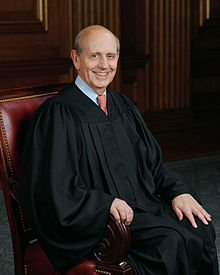
Back ستيفن براير Arabic ستيفن براير ARZ Stiven Brayer Azerbaijani Stephen Breyer Czech Stephen Breyer Danish Stephen Breyer German Στίβεν Μπρέγιερ Greek Stephen Breyer Spanish استیون برایر Persian Stephen Breyer Finnish
Stephen Breyer | |
|---|---|
 Official portrait, c. 2006 | |
| Associate Justice of the Supreme Court of the United States | |
| In office August 3, 1994 – June 30, 2022 | |
| Nominated by | Bill Clinton |
| Preceded by | Harry Blackmun |
| Succeeded by | Ketanji Brown Jackson |
| Chief Judge of the United States Court of Appeals for the First Circuit | |
| In office March 1990 – August 3, 1994 | |
| Preceded by | Levin H. Campbell |
| Succeeded by | Juan R. Torruella |
| Judge of the United States Court of Appeals for the First Circuit | |
| In office December 10, 1980 – August 3, 1994 | |
| Nominated by | Jimmy Carter |
| Preceded by | Seat established |
| Succeeded by | Sandra Lynch |
| Personal details | |
| Born | Stephen Gerald Breyer August 15, 1938 San Francisco, California, U.S. |
| Political party | Democratic[1] |
| Spouse |
Joanna Hare (m. 1967) |
| Children | 3 |
| Relatives | Charles Breyer (brother) |
| Education | |
| Signature | |
| Military service | |
| Allegiance | |
| Branch/service | |
| Years of service | 1957–1965 |
| Rank | |
| Unit | |
| Battles/wars | Vietnam War |
| This article is part of a series on |
| Liberalism in the United States |
|---|
 |
Stephen Gerald Breyer (/ˈbraɪ.ər/ BRY-ər; born August 15, 1938) is an American lawyer and jurist who served as an associate justice of the U.S. Supreme Court from 1994 until his retirement in 2022. He was nominated by President Bill Clinton, and replaced retiring justice Harry Blackmun. Breyer was generally associated with the liberal wing of the Court.[2] Since his retirement, he has been the Byrne Professor of Administrative Law and Process at Harvard Law School.[3]
Born in San Francisco, Breyer attended Stanford University and the University of Oxford, and graduated from Harvard Law School in 1964.[4] After a clerkship with Associate Justice Arthur Goldberg in 1964–65, Breyer was a law professor and lecturer at Harvard Law School from 1967 until 1980.[4] He specialized in administrative law, writing textbooks that remain in use today. He held other prominent positions before being nominated to the Supreme Court, including special assistant to the United States assistant attorney general for antitrust and assistant special prosecutor on the Watergate Special Prosecution Force in 1973. Breyer became a federal judge in 1980, when he was appointed to the U.S. Court of Appeals for the First Circuit. In his 2005 book Active Liberty, Breyer made his first attempt to systematically communicate his views on legal theory, arguing that the judiciary should seek to resolve issues in a manner that encourages popular participation in governmental decisions.
On January 27, 2022, Breyer and President Joe Biden announced Breyer's intention to retire from the Supreme Court.[5] On February 25, 2022, Biden nominated Ketanji Brown Jackson, a judge on the U.S. Court of Appeals for the District of Columbia Circuit and one of Breyer's former law clerks, to succeed him.[6] Breyer remained on the Supreme Court until June 30, 2022, when Jackson succeeded him.[7][8] Breyer wrote majority opinions in landmark Supreme Court cases such as Mahanoy Area School District v. B.L., United States v. Lara, and Google v. Oracle and notable dissents questioning the constitutionality of the death penalty in cases such as Glossip v. Gross.
- ^ Weiss, Debra Cassens (February 3, 2020). "Which SCOTUS justices are registered Democrats or Republicans? Fix the Court investigates". ABA Journal. Retrieved March 9, 2024.
- ^ Kersch, Ken (2006). "Justice Breyer's Mandarin Liberty". University of Chicago Law Review. 73: 759–822. Archived from the original on December 26, 2017.
As his decision to characterize both the New Deal and Warren Courts as centrally committed to democracy and 'active liberty' makes clear, Justice Breyer identifies his own constitutional agenda with that of these earlier courts, and positions himself, in significant respects, as a partisan of midcentury constitutional liberalism.
- ^ "Justice Stephen Breyer returns to Harvard Law School". Harvard Law Today (Press release). July 15, 2022. Retrieved July 16, 2022.
- ^ a b Smentkowski, Brian P. (August 11, 2021). "Stephen Breyer". Encyclopædia Britannica. Archived from the original on October 9, 2021.
Breyеr received bachelor's degrees from Stanford University (1959) and the University of Oxford (1961), which he attended on a Rhodes Scholarship, and a law degree from Harvard University (1964). In 1964–65 he clerked for U.S. Supreme Court Justice Arthur J. Goldberg. He taught law at Harvard University from 1967 to 1994.
- ^ Shear, Michael (January 27, 2022). "Biden calls Breyer a 'model public servant' and plans to name his successor soon". The New York Times. Retrieved January 27, 2022.
- ^ Macaya, Melissa (February 25, 2022). "Biden nominates Ketanji Brown Jackson to Supreme Court". CNN. Retrieved February 26, 2022.
- ^ Chowdhury, Maureen; Lee, Ji Min; Wagner, Meg; Macaya, Melissa (April 7, 2022). "Jackson won't be sworn in until Justice Stephen Breyer retires". CNN. Retrieved April 7, 2022.
- ^ Blitzer, Ronn (June 29, 2022). "Supreme Court Justice Stephen Breyer to retire Thursday: 'It has been my great honor'". Fox News. Retrieved June 29, 2022.